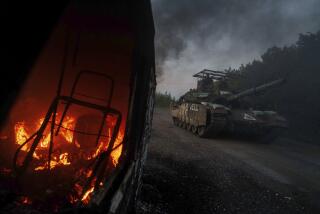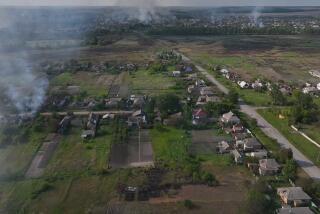Reality Belies Moscow’s Official Line on Grozny : Chechnya: Kremlin says city has been nearly subdued. Embattled troops tell a different story.
- Share via
GROZNY, Russia — The word from Moscow on Tuesday was that this city has been all but conquered and order is being restored. Chechen commanders have pulled their headquarters out of the rebel capital, and Russian soldiers are reportedly rebuilding the city.
The view from Grozny is less confident.
When President Boris N. Yeltsin’s comment that troops here are rebuilding the city was carried over the radio last week, a Russian Interior Ministry captain said he had to turn up the volume “so I could hear him over the gunfire outside my window.”
More than 15,000 Interior Ministry troops have followed the army into Grozny to “mop up” and restore order. Officially, they control two-thirds of the city. In reality, that “control” is tenuous.
Around an evening meal of spaghetti and tushonka , stewed meat from brassy Soviet-era cans that has become a Grozny staple, followed by oranges and vodka, four young officers of the Interior Ministry’s elite ODON (formerly Dzerzhinsky) division spoke frankly about the situation.
“This region of the city we’re in we observe but don’t control,” said Vadim L., 31, a squat, dark-bearded major in the special forces.
Vadim’s fellow officers nodded in solemn agreement. The crack of machine-gun fire, the low thud of shelling and the dim, flickering generator-fed lights added eloquence to their silence.
All of the officers asked that their last names be withheld. Chechen fighters have pledged to take revenge on Russian military families for the war, which began Dec. 11, has cost thousands of lives and has flattened much of Grozny.
“If racing in an APC (armored personnel carrier) through this region and peering out the windows at it means controlling it, then we control it,” Capt. Sergei K., 29, said of the army’s grip on the capital.
When Soviet dictator Josef Stalin ordered the deportation of the Chechen people in 1944, it was the Dzerzhinsky division that carried out the order. Now the renamed unit’s mission includes gaining the trust of the Chechen people--amid incessant rumors that Moscow plans a second deportation as soon as it can seize control of the secessionist republic.
The deportation rumors--although angrily denied by Russia--are easier to believe when listening to Col. Sergei P., commander of an ODON regiment.
“After all the atrocities I’ve heard of here, I would agree with Stalin,” he said. “The entire Chechen nation shouldn’t just be deported, it should be exterminated.”
While the colonel spoke, his younger officers looked at the floors, the ceilings, their teacups. They preferred to talk about what they do to help the locals: share their own rations with citizens, bring them newspapers, send letters for them through the military mailbag.
The Interior Ministry troops stay indoors at night--most of them barricaded behind barbed wire, concrete blocks and dug-in tanks, in schools turned headquarters. Those soldiers unfortunate enough to be stationed at one of the smaller posts throughout the capital spend the night and much of the day under machine-gun fire.
None of dozens of officers and soldiers interviewed had heard of a heavy-artillery cease-fire announced Monday after talks between Russian and Chechen field commanders, and shelling continued Tuesday in Grozny. A Russian Defense Ministry official said the air force had stopped aerial bombardment, at least until talks resume today.
But hope for a successful cease-fire grew fainter Tuesday as disagreements surfaced inside the Russian leadership.
Despite reassurances from dovish Prime Minister Viktor S. Chernomyrdin that the peace negotiations had Moscow’s official blessing, top military and security officials predicted that the talks would not produce a lasting truce.
Meanwhile, the blood is still flowing in the southern Chernorechye quarter of the city, where Chechen fighters remain in control, and open war, complete with Russian helicopter gunships and heavy shelling, continues.
“The mass media lie,” said Maj. Alexander G., a 34-year-old commander of one of the ODON division’s battalions. “They say the situation is under control, the Chechen fighters have all left for Gudermes (a large village nearby) or somewhere else. None of that is true. Nor is the encirclement of Grozny complete, far from it.”
The major was interrupted by a voice over his walkie-talkie: “Officer down, wounded!” He excused himself and left quickly.
In the daytime, the city is a mix of the ordinary and the frightening. To avoid snipers, tanks and armored personnel carriers speed down narrow residential streets--streets where children still laugh and play, and where the occasional corpse still lies where it fell.
Civilians shuffle through downtown streets, curiously indifferent to the continuing crack of gunfire.
“They shoot here in the center, and they shoot in the suburbs. Everywhere the shooting continues,” said Valya Khomenko, 55, a kindergarten teacher trudging past the presidential palace--now a bombed-out shell.
In each hand Khomenko carried bags of items salvaged from her daughter’s deserted apartment--fruit preserves, a pillow and a pair of slippers. Neighbors said Russian soldiers looted the rest.
“I understand why they took all the food; the poor soldiers have to eat too,” Khomenko said. “But why did they have to stomp all over my two new raincoats with their boots? And why did they have to go through my daughter’s underwear, and leave her bras and panties all over the floor? I saw them, all muddy, and cried and cried and picked them up. Why do they have to do that?”
When Tamara Kholukhayeva, 51, reached her apartment building after several hours of walking, she saw an armored personnel carrier parked out front with the rug from her bedroom lying on top. Kholukhayeva shamed one officer into opening the hatch. Inside she saw more rugs, her television and a baby carriage.
“They gave them back, but my neighbor said this had been their second trip to the apartment. She also said the soldiers had told her to keep her mouth shut or they would kill her,” Kholukhayeva said.
“Everyone is looting, but especially the army soldiers,” said Boris R., a bearded captain of the Moscow police, brought in by the Interior Ministry to help control Grozny. “They ship what they steal out on military transport. Their brass knows and cooperates.”
Times special correspondent Sergei Loiko contributed to this article.
More to Read
Sign up for Essential California
The most important California stories and recommendations in your inbox every morning.
You may occasionally receive promotional content from the Los Angeles Times.













